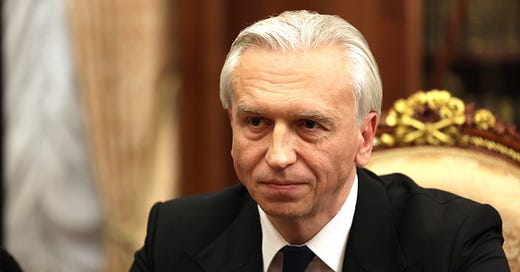Chairman of the Management Board of Gazprom Neft PJSC Alexander Dyukov.
The saga of what’s now Gazprom Neft is quite the tale from the 1990’s Rape of Russia by neoliberal gangsters and allied at times oligarchs. Wiki’s bio provides a descent sketch of that indecency, but it omits how Team Putin was able to recapture it and marry what it was at the time—Sibneft—to Gazprom and essentially renationalize it completely, although about 5% of its shares are publicly traded. In the short chat Putin has with Dyukov that we’re allowed to read, the emphasis is on investment aimed at modernization and 100% sovereignty of all its works. What it’s done and is in the process of doing goes in the opposite direction of Western oil majors and is a major reason why Russia’s growth rate exceeds 5% and might even reach 8% for the entire year. And I’m certain it’s deeply involved in the engineering school efforts discussed a few days ago. The bottom line is if the West intends to compete with the rising Global Majority Bloc, it will need to jettison its current political-economic ideology, very heavily tax the rent seekers to whittle down the massive debt overhang, and return to the basics of industrial capitalism; but, to do that, the political rot and corruption at the top needs to be cropped and thrown into a dumpster.
Vladimir Putin: Alexander Valeryevich, Gazprom Neft has shown good results. Last year, sales revenue was a record for the entire history of the company – 3.5 trillion rubles, EBITDA – 1.3 trillion. [Earnings before interest, taxes, depreciation, and amortization]
What makes me happy is the capital investment – how much do you have, over 570 billion rubles of capital investment? The processing depth of raw materials is record-breaking and very good. You use modern technologies, including digital solutions.
What are the company's prospects and how do you assess them? And what does it take to support you?
Alexey Dyukov: Dear Vladimir Vladimirovich,
You're absolutely right. Last year was a successful one for our company. If we talk about this year, we also showed decent results in the first quarter. The company operates steadily, providing oil and petroleum products to consumers both in the domestic market and in the markets of other countries. Of course, our priority is to ensure the domestic market.
The Russian economy is showing high growth rates. Consumption of motor fuels and other petroleum products, lubricants, bitumen materials, and petrochemical products is growing. Both the industry as a whole and Gazprom Neft are responding to this by increasing production volumes and supplies to the domestic market.
This, of course, allows us to improve our financial performance and increase tax remittances to the budget. Based on our results in the first quarter, we increased our tax remittances by 57 percent compared to the first quarter of 2023.
I said that the company is working steadily, but we certainly set ourselves the task of not only working steadily, but also actively developing. For this purpose, an investment program in mining is being implemented. In April, we put the third block of the Urengoy field into commercial operation, and a number of large deposits are being developed in the Arctic and Eastern Siberia.
A very important area of work for us is the development of technologies and the development of hard-to-recover reserves. In the company's production share, hard-to-recover reserves now account for 65 percent, almost 70 percent. This is a very important area of work.
And, of course, recycling is also a very important area. We are completing a full-scale upgrade. Last year, we completed the modernization of the Omsk oil Refinery. This is the largest oil refinery in our country, with 21 million tons of refining capacity. At the moment, it is, in fact, a new oil refinery with a processing depth of 99 percent. 90 percent of installations are already new installations.
And next year we will complete a full-scale modernization of the Moscow Oil Refinery. Accordingly, the depth of [processing] will also reach 99 percent.
By upgrading, we not only increase the depth, but also expand the range of petroleum products that we produce. So, at the Omsk Oil Refinery, we already produce more than a thousand names of various petroleum products: from motor fuels to lubricants, bituminous materials, needle coke for metallurgists, as well as catalysts and petrochemical products.
If we talk about the industry as a whole, the industry has made a real breakthrough in its development over the past 25 years. Production increased by 65 percent during this time, and this allowed the Russian Federation to return to the list of leading oil producers and play an important role in ensuring the stability of the global market. And of course, this growth was also supported by technological development, which allowed the development of new oil and gas provinces in the Arctic and Eastern Siberia. And of course, it involves hard-to-recover reserves, which I mentioned earlier.
This work requires special materials, special equipment, and technologies. A lot has been done during this time. We have all the technologies to work in new regions-and working in new regions and provinces has its own specifics-and to work with hard-to-recover reserves, we need new technologies, equipment and digital technologies. Accordingly, all this is there.
Vladimir Putin: I know that your company pays great attention, as I have already said, to the use of the latest technologies and solutions, including digital ones.
Of all the things that you apply, what gives you the greatest impact, what makes you happy especially after using these modern technologies? What would you like to focus on as the most promising areas?
Alexander Dyukov: Mr President, the oil industry is a high-tech industry. In order to find, extract and process oil, thousands of technologies are needed, thousands of different types of equipment are needed, namely 1,400 types of basic equipment that is necessary for this.
Basically, every type of equipment is important. I want to say that if we talk about machine builders and Russian oil companies, we have done a lot of work during this time to achieve import independence and ensure technological independence.
At the moment, if we talk about a shortage of some equipment, then this is only 200 positions. 1200 positions – this is the work that has been done in recent years. We can be proud of every technology and type of equipment that we have learned to produce.
Our goal is to eliminate this shortage of equipment by 2027. In terms of technology, we are import-independent, completely independent technologically. There is a slight dependency on hardware, but it will be eliminated by 2027. This will not only allow us to achieve technological independence, but also provide additional orders for our machine builders. We estimate the volume of these additional orders at one trillion rubles.
And of course, digital technologies are very important and can significantly improve the efficiency of working with hard-to-recover reserves, as well as with conventional, traditional reserves. We apply them throughout the entire value chain: from exploration to production, processing and sales.
Vladimir Putin: Good. [My Emphasis]
It should be noted that Gazprom Neft works with Venezuela in the production of its unique heavy oil from the Orinoco Oil Belt which contains the vast majority of the world’s petroleum-based hydrocarbons and characterized as “hard-to-recover reserves.”
The primary issue is the utter failure of the West’s illegal sanctions war against Russia to do any damage. The failure of Obama’s sanctions after Crimea voted to return to Russia in 2014 should have served notice that such a strategy would prove more damaging to everyone but Russia since that’s what precisely happened. As we saw, however, the illegal sanctions were also aimed at decoupling Europe’s economy from its natural geoeconomic dependency on Russian resources and have proved to be very effective since European politicos are vassal satraps of the Outlaw US Empire. It’s taken ten years for European voters to finally register their great disapproval with those satraps and begin the process of rooting them out from government. Unfortunately, they still have the EU/NATO bondage to escape from that will prove harder to accomplish.
Meanwhile, Russia’s economy continues to boom thanks to the many investments being made, its rising consumer spending power, and the expansion in the variety of domestic products available for domestic consumption. As was mentioned above, the focus on becoming technologically sovereign resulted in a boon for domestic suppliers as the one trillion rubles spent by Gazprom Neft alone provided a massive boost from just one large company. Altogether, I’d estimate 2023’s overall spending in that one sector to be over 15 Trillion rubles (about $170 Billion), which cascaded through the entire economy helping the boom in small and medium sized businesses (SMBs). The West’s “reverse protectionism” it applied to Russia and is trying to do with China is akin to stepping on a rake over and over.
Jon looks a lot like Biden, or is that the other way around.
*
*
*
Like what you’ve been reading at Karlof1’s Substack? Then please consider subscribing and choosing to make a monthly/yearly pledge to enable my efforts in this challenging realm. Thank You!






The squirrel said to the forest: I'm going to sanction you!
Lost all of my investments in Gazprom and Lukoil, courtesy of our US warmongers.
Great companies, both.
Royal Dutch Shell which has been owned in my family for generations left the Netherlands. Dutch courts ruled they were not green enough. I was the last in my family to leave them.